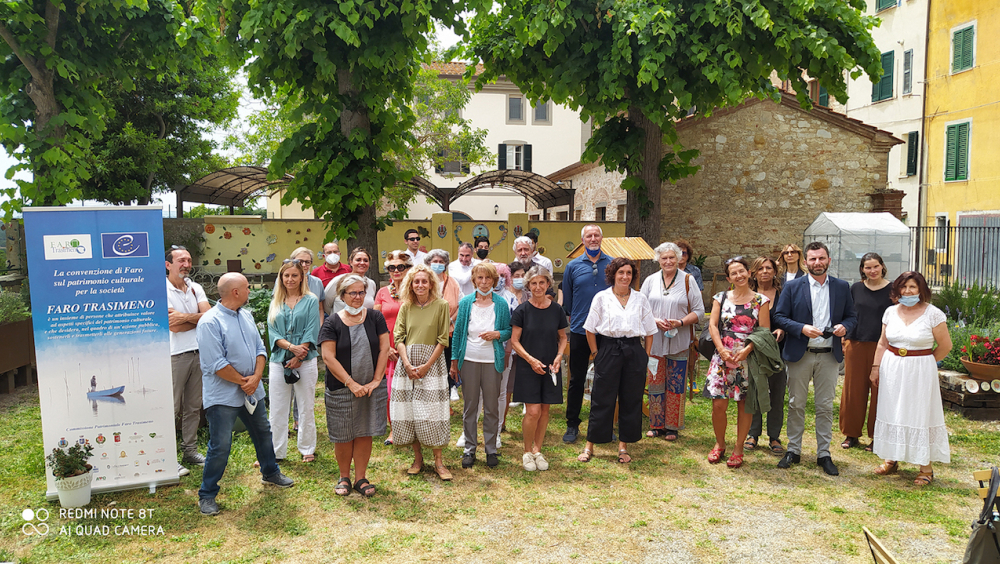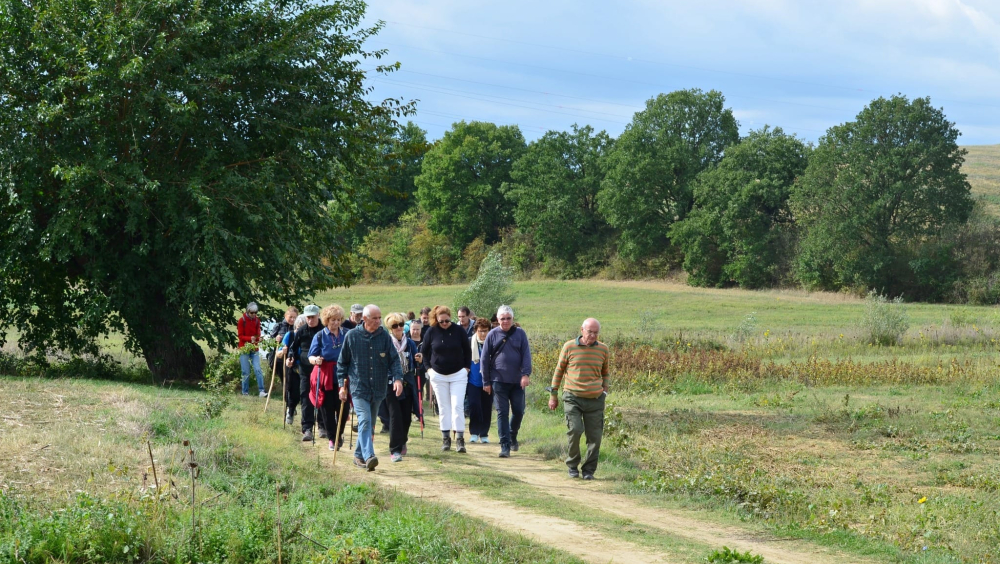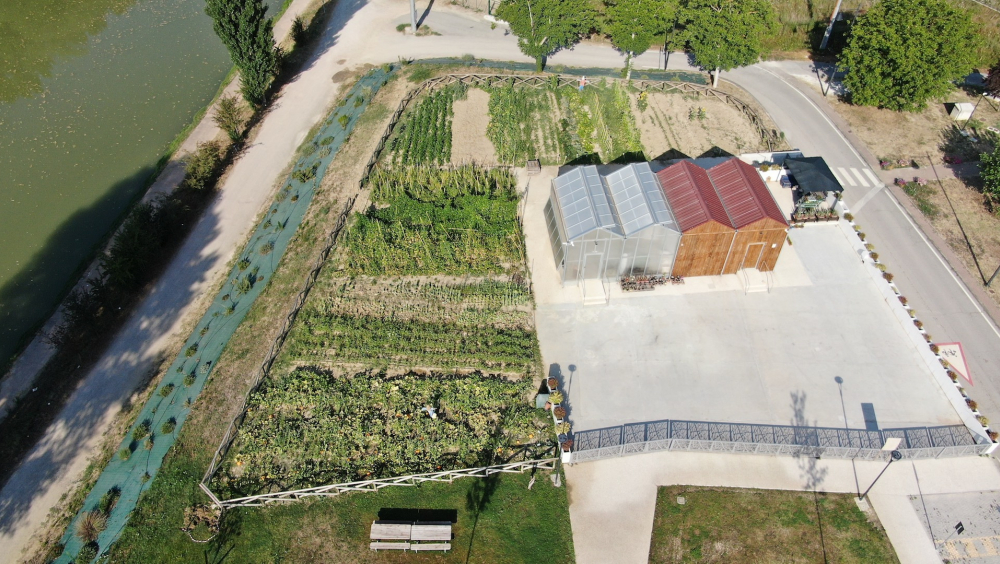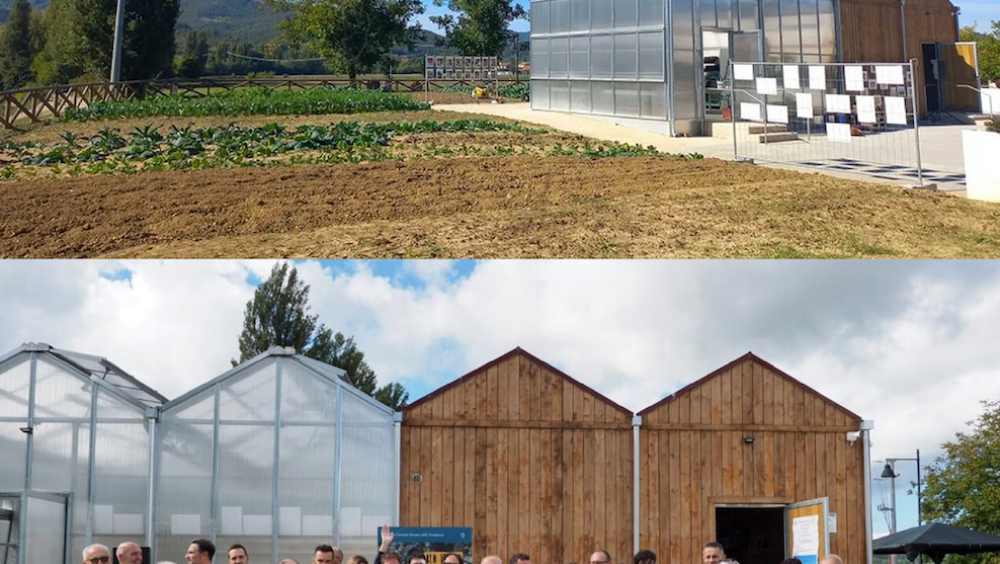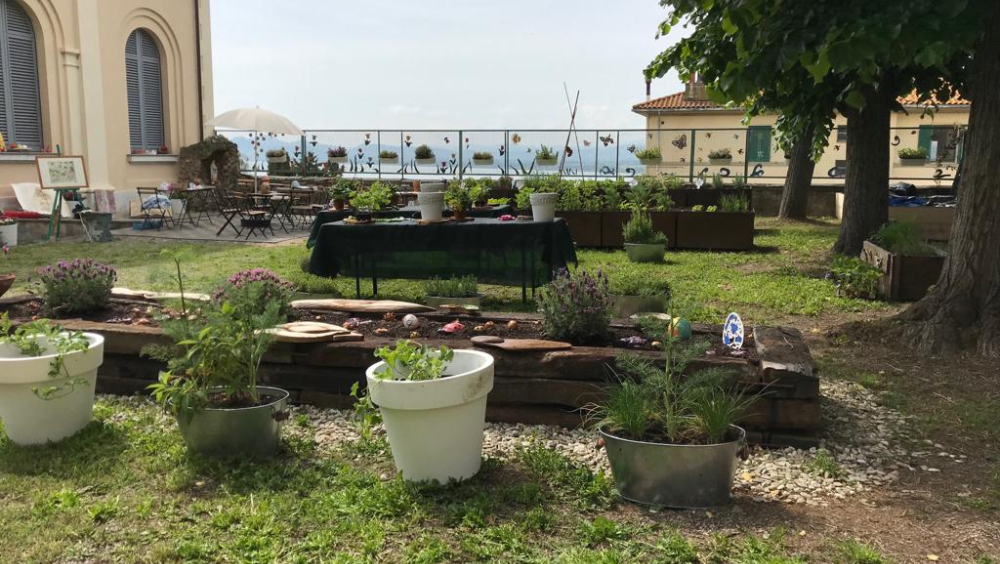"Urban Agriculture: Keepers of seeds"
Ince 2019 our NGO is involved in the development of the European Heritage days. The main event/activity of the 2022 edition was focused on "Urban Agriculture: Keepers of seeds".
The heritage walking was organized to meet in different places in Castiglione del Lago e Umbertide, guested in social urban gardens where we had the opportunity to meet seed’s keepers, farmers who saved seeds from the plants that grew best in their climates and soils, and their communities’ crops and cuisines evolved together. The seeds we inherited in the Trasimeno Lake area (Umbria Region), carry the rich genetic legacy of the growers who came before us.
Urban agriculture and heritage walking provides a great opportunity for physical exercise in a green space, and lets people relax.
Such activities and places are allow the community to ameliorate their area, by building public infrastructure such as benches or “quiet areas” for nature contemplation. Also, ensuring accessibility by older participants and children with adequate pathways can be a good practice to enhance recreation. Important aspect has been the design of activities for disable people, young and adults. Also, including informative panels explaining ecosystem services provided by urban agriculture, and agricultural species and practices being used, can improve both recreation and collective memory (see below).
Similar to recreational services, increased physical and mental health provided by urban agriculture and heritage walks can be improved by enhancing the capacity of agricultural areas for physical exercise and reduction of stress. Urban agriculture provides multiple opportunities for cognitive development. It plays a critical role in recovering practical knowledge related to food production, thus reducing what it is known as the “extinction of experience” of human–nature interaction and a collective ‘forgetting’ of how to grow food and manage the regulatory ecosystem services required to do so.
Sustainable Heritage is the theme for the 2022 European Heritage Days: a focus on the active role of communities building a more sustainable and resilient future for European heritage, in the context of environmental changes and related risks.
It all begins with the seed. Its research, rediscovery and selection is of fundamental importance for us. The vegetable and instinctive intelligence of which the ancient seed is the bearer allows it to be autonomous in growth and adaptable to climate change, in addition to the extraordinary ability to simplify cultivation and offer crops without chemical treatments. The intelligence of the seeds, their full flavor and ease of digestion due to their moderate and gentle gluten are the 3 pillars of our productions.
First stop of the European Heritage Day
Address: Hortus Trasimeni: we cultivate in solidarity
Castiglione del Lago (Perugia)
9.00 -12.00
Participants 45 people
The first stop was a visit to a small "paradise on earth" in the heart of Castiglione del Lago, the Hortus Trasimeni: let's cultivate solidarity": officially open to citizens for four years.
A vegetable garden where medicinal plants, vegetables and flowers have been planted. The people present met those responsible and understood theirs complex “eco-agri-food” systems.
We have been given some soft wheat, durum wheat, primitive spelled, red chickpeas, ruby and black corn, seeds evolved in the field, sowing after sowing. Varieties dating back to the 1900s and others much older. All guests of the patrimonial walk received a bag of precious seeds from the earth to continue sowing in their gardens.
In collaboration with civil society we co-develop a roadmap of action on how natural and Urban Agriculture systems decision-makers can measure, manage and reward responsible stewardship of natural, human, social and produced capital.
The Faro Trasimeno association has been dealing with environmental sustainability and social inclusion for years, proposing initiatives aimed at the well-being and quality of life of vulnerable people who also pass through the care of a vegetable garden. "Hortus Trasimeni", in the heart of the historic center, is the first common good of Castiglione del Lago with a collaboration agreement between the municipal administration and a citizens' association. Create, taste, share new forms of freedom and autonomy. The volunteers of the association promoting the European Heritage Day have become "guardian farmers" for the conservation of the agricultural biodiversity of the local varieties in the Trasimeno bio-territory, applying techniques dictated by the local rural tradition, in a very close and mutually dependent relationship, between those carries out the "ex situ" conservation (germplasm banks) and those who carry out the "in situ" conservation (guardian growers).
Include the common practice of protecting insectivorous bird habitats and supporting pest regulation. Knowledge, experience and practice opportunities provided by urban agriculture can be used by environmental educators to develop affective links to urban ecosystems and to restore and maintain social-ecological memory, the interlinks between human actions and ecological processes.
The benefits of preserving a collective memory of food production have been highlighted in terms of increased resilience and adaptive capacities in urban systems, and the potential to sustain ecosystem services, like food in times of crisis.
Secondo stop of the European Heritage Day
Title: ORTI FELICI
Umbertide (Perugia)
Continuing the journey in the afternoon we arrived in Umbertide to visit the social, therapeutic garden, a true passage between the health services and the city, intended to be a bridge to a social project and for this reason its public dimension is also very important.
Urban regeneration project to create a vegetable garden and greenhouses along the Tiber river.
The project we are presenting wants to be an opportunity for an individual reconquest of people with serious difficulties to rediscover the taste and ability to live with others. Creating, enjoying, sharing as a new form of freedom and autonomy, for these reasons it seems important to us to affirm the right to a social garden for everyone.
The social, therapeutic garden, a real passage between the health services and the city, wants to be the bridge of a social project and for this reason its public dimension is also important. The project we are presenting wants to be an opportunity for an individual reconquest of people with serious difficulties to rediscover the taste and ability to live with others.
Creating, enjoying, sharing as a new form of freedom and autonomy, for these reasons it seems important to us to affirm the right to a social garden for everyone. Important service provided by urban agriculture is the increase of physical and mental health. Participating in urban agriculture enhance human health and well-being since it provides an important opportunity for physical exercise and to reduce stress by providing a sense of peaceful and tranquility.
As more of the world population live in urban areas with less interaction with the nature and its phenomena, the 21st century children need being taught these cultural, natural and collective heritages. Urban agriculture applications by non-professional city habitants provide an informal learning context for these children. Mentorship training, where older experienced gardeners teach the younger, is especially important for transmission of knowledge related with food production. A diversity of garden typographies helps to attract different age-groups and ethnicities.
Participants in the European Heritage Day were invited together with disabled people to practice planting San Francesco tomato seedlings in the greenhouse. The ancient seed has great value of true natural and cultural heritage.
The day we spent made us realize how important it is urban agricultural areas being is spaces for social interaction with other gardeners, neighbors and city inhabitants; where relations of solidarity, community cohesion and mutual support are strengthened. Thus, participation in urban agriculture can give rise to important societal benefits such as social cohesion (i.e., people’s willingness to cooperate with one another), integration, promotion of shared interests, neighborhood participation, and defining identity and sense of community.
Conclusion
The group of participants was passionate about the rediscovery of endangered varieties that can subvert the logic of the market with serious environmental problems. Agricultural innovations within urban systems that sustainably stimulate growth are needed to feed the future’s older and crowded population. The Faro Trasimeno action will devote itself with greater commitment to the research, recovery and multiplication of vegetables, cereals, flowers, herbs and other herbaceous food plants with the aim of establishing a common deposit of seeds available to members and collecting elements of documentation useful for preserving related knowledge, so as not to reduce them to mere genetic resources, but a true cultural and natural heritage.
Faro Trasimeno in 2019 set up a "heritage community" with citizens who attribute value to particular and identifying features of the material, natural and immaterial cultural heritage of our region. We are engaged in public actions, to support and transmit heritage contents and expressions to future generations. We collaborate with schools of all levels. We organize meetings with many local, national and European associations.
Together with the Council of Europe, we are part of the Italian headquarters in Venice of the Italian Faro Convention Network (IFCN). In our Hortus Trasimeni, the first European meeting of the IFCN, took place with the the director Luisella Pavan-Woolfe.
The "Orti Urbani" project brings together partners from the Umbria Region and also national and European partners in a consortium with the objectives of developing and disseminating innovations in the field of urban agriculture, promoting the sustainability of food systems, updating education on the agro-food theme, the dissemination of knowledge on modern agricultural practices aimed at both the general public and entrepreneurs in the sector, through vocational and professional training.
The first patrimonial community will focus on the recovery, in the future, of two important cultural patrimonies now in an evident state of abandonment:
The ex-Pomodoraia tomato factory, historical and architectural heritage of Castiglione del Lago.
Villa Zenobi and the Porcinai garden with the cultivation of tulips, a tradition that has now fallen into disuse which in the past made Castiglione del Lago one of the most important cultivation centres nationwide. This is where the tulip festival was born, which is celebrated every year in April, but today tulips are bought in Italy and abroad.
Below is a video-documentary realized for the creation of the first heritage community, which has as its object the tomato factory and the cultivation of tulips in Castiglione del Lago.
